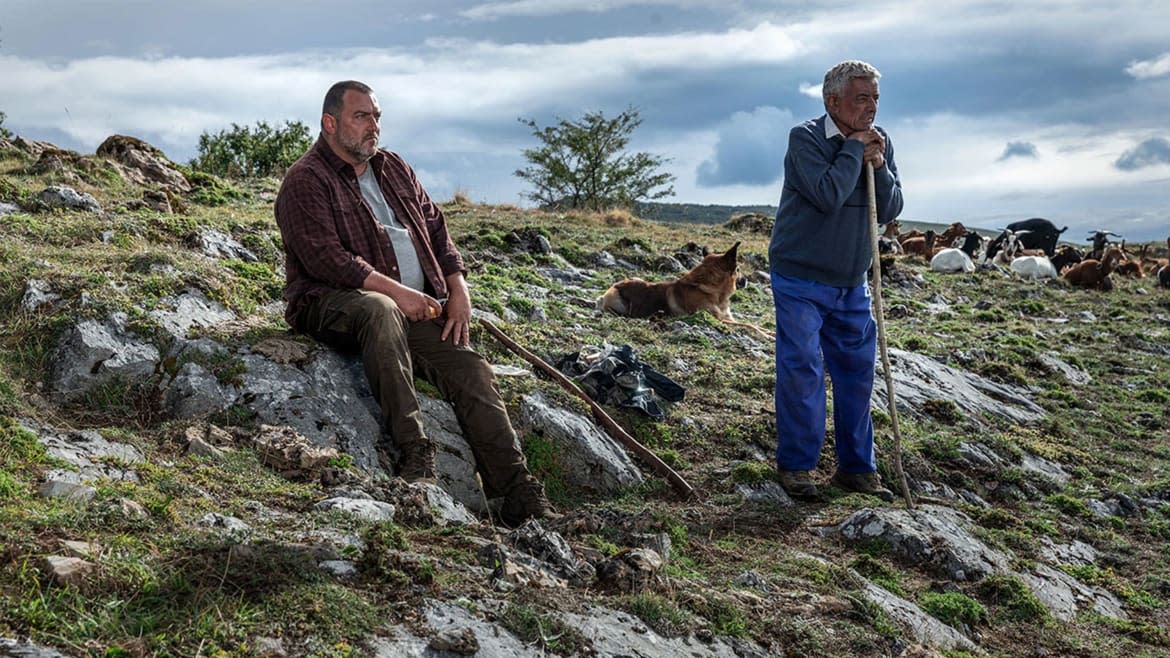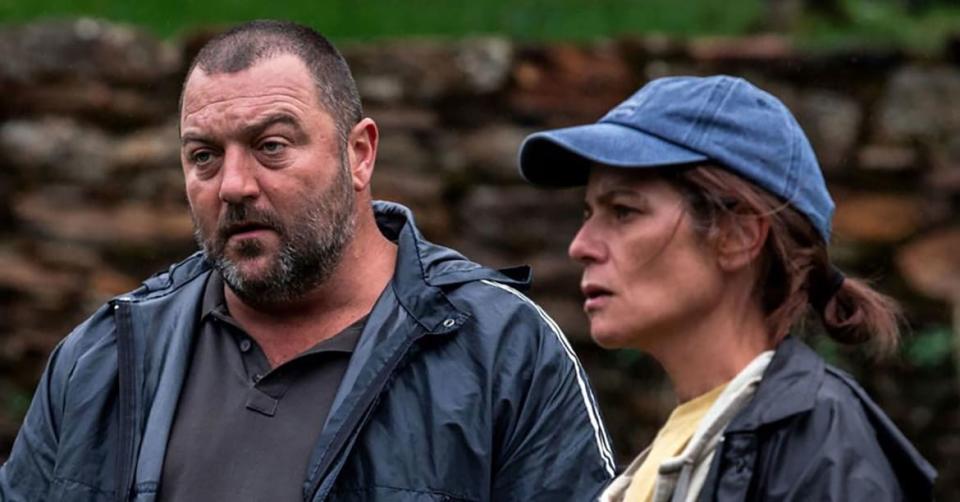‘The Beasts’: Small-Town Life Has Never Been This Intense

- Oops!Something went wrong.Please try again later.
One of the year’s tensest movie scenes occurs midway through The Beasts and it boasts no (physical) violence, no (overt) threats, and no (satisfactory) resolution. Rather, it features two men at a bar sharing a bottle of liquor while discussing their ongoing feud, which is driven by financial and cultural grievances and has already turned their tranquil hamlet into a bitter battleground between the old and new, the uneducated and the enlightened, the provincial and the worldly.
Shot in a single long, static take at night, the shadows on these figures’ faces echoing their darkening rapport and the exchange’s duration amplifying its anxiety, it’s a confrontation that’s as expertly written as it is performed. Its characters’ fear and fury are so intense, the scene practically trembles.
Arriving in U.S. theaters on July 28 following its premiere at this year’s Cannes Film Festival, director Rodrigo Sorogoyen’s The Beasts is a coiled snake of a Spanish thriller. An inspired-by-true-events tale whose conflict pits neighbor against neighbor, it fixates on Antoine (Denis Ménochet), a Frenchman who’s moved to the Galician countryside in Spain to farm with his wife Olga (Marina Foïs) and to restore derelict homes—at his own cost, and without plans for profiting from them—that he hopes will revitalize this moribund region.
A burly man with sensitive eyes, Antoine found this Ourense province by fortune, waking up in its fields after the last of his many meandering drunken expeditions. He now wants to live a life of quiet, peaceful altruism, tending to his vegetable garden and giving back to the community.
Antoine may have adopted this place as his home, but it has not been quite so welcoming in return. The Beasts begins in a local watering hole where the all-male conversation is being roundly dominated by Xan (Luis Zahera), a lifelong resident whose brother Lorenzo (Diego Anido) is a “brute” with impaired mental faculties due to a past animal-related accident.
Fearsomely lording over this chat as they play dominoes, Xan proves a menace from the start and, as Sorogoyen and co-writer Isabel Peña’s script gradually elucidates, the prime target of his wrath is Antoine. Xan resents the farmer and fixer-upper (whom he derisively refers to as “Frenchy”) for being an interloper and, just as crucially, for objecting to a business deal to install modern wind turbines along the area’s ridges. This would make Xan and everyone else wealthy enough to escape this going-nowhere village. Yet believing that it would both spoil the milieu’s rustic serenity and net smaller profits than are being promised by developers, Antoine stands in the way of this progress, and has consequently become Xan’s enemy.

Marina Fois and Denis Menochet in 'The Beasts'
With a scruffy face and the belligerent attitude of a bully who’s confident that few, if any, will push back against his frightening behavior, Xan is detestable from his first on-screen moments. His subsequent intimidation tactics (with Lorenzo always by his side) only reinforce that impression, beginning with his decision to sabotage Antoine and Olga’s crops, and escalating to a late-night roadside altercation designed to petrify the French couple. Vacillating between whispered seething and nasty bluster, Zahera embodies Xan as a cretin of the scariest order, one who’s not afraid to express his antagonism but who also likes to keep his precise intentions secret, the better to instill unpredictable, volatile terror in his nemeses.
Xan and Lorenzo, a slow-witted minion whose slack-jawed face radiates cruelty and who often has a gun slung over his shoulder, are The Beasts’ nominal villains. The film’s Antoine-fixated perspective generates empathy for his plight and disgust for his adversaries, as does Ménochet’s ability to cast his character as an easygoing man who’s willing, if the occasion demands it, to use his imposing presence to stand up for himself.
‘Twisted Metal’ Ruins a Popular Video Game With Juvenile, Unbearable Mayhem
Nonetheless, in the aforementioned centerpiece, Sorogoyen complicates one’s perspective on his protagonists, at least insofar as he paints Xan’s desire for a better life as reasonable and sympathetic, and Antoine’s intractability—born from his eco-friendly worldview—as stubborn and selfish. By avoiding easy black-and-white characterizations and drama, the director enriches his scenario, transforming it from a simple good-vs-evil, rural-vs-urban tale into a hostile clash of cultures, beliefs and goals, as well as of two hard-headed individuals unwilling to compromise.
The Beasts’ simmering dynamics are exacerbated by fellow area residents who refuse to get embroiled in this mess, by police officers who want to engage in both-sidesism (out of their own apparent prejudice against the foreigners), and by Antoine’s actions, which soon involve trying to surreptitiously record Xan and Lorenzo with a video camera hidden in his coat pocket. This situation initially peaks with Antoine and Xan’s barroom sit-down, though that’s far from the end of this saga.
Thanks to a drastic encounter, the proceedings make a sharp right turn shortly after their midway point, shifting focus onto a different character and building to another prolonged single-take conversation, this time between Olga and her visiting daughter Marie (Marie Colomb), who can’t comprehend why any adult would want to stay in a countryside that detests them. In that blistering back-and-forth—in which cinematographer Alex de Pablo’s roving camera gives each woman equal compassionate attention—the film adds an additional familial dimension to its strife-plagued narrative, and that element only builds as everything comes to a head.
The Only Scary Thing About the New ‘Haunted Mansion’ Movie Is How Bad It Is
The Beasts opens with a slow-motion vision of men wrestling steeds into submission that follows introductory text which reads, “To allow them to live freely, the Aloitadores immobilize the bestas [beasts] with their bodies to clip and tag them.” The push-pull between restraint and liberation is central to Sorogoyen’s film, whose score of discordant strings and clacking beats portends mounting trouble, and whose atmosphere of aggression feels destined to result in calamity.
It’s a controlled and concise pot-boiler of stresses and strains that nobody is capable of managing, much less quelling, and in the superb performances of its leads—including Foïs, whose stone-faced countenance reflects Olga’s trepidation, antipathy, and resolve—it becomes a small-scale tragedy about arrogant intolerance and self-centeredness that’s at once highly specific and, more depressing still, universal.
Liked this review? Sign up to get our weekly See Skip newsletter every Tuesday and find out what new shows and movies are worth watching, and which aren’t.
Get the Daily Beast's biggest scoops and scandals delivered right to your inbox. Sign up now.
Stay informed and gain unlimited access to the Daily Beast's unmatched reporting. Subscribe now.

